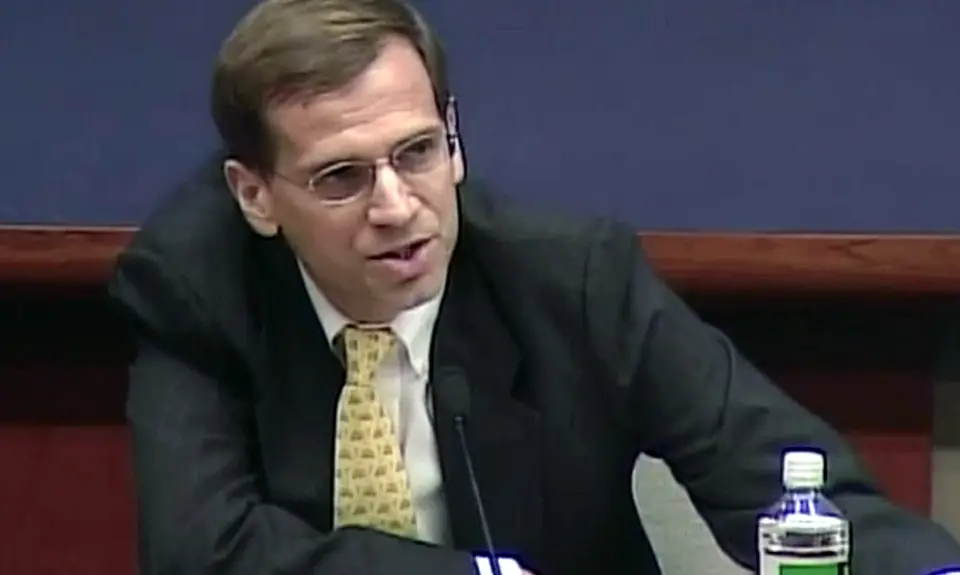On November 9, the Senate Judiciary Committee is scheduled to vote on Greg Katsas’ nomination to the U.S. Court of Appeals for the D.C. Circuit. Katsas has been loyally serving Donald Trump as his deputy White House Counsel since the beginning of his presidency. PFAW has written that Katsas’ service for this particular president disqualifies him from being a circuit court judge. As we stated after the confirmation hearing: Katsas has chosen to provide legal advice to a president who has shown nothing but contempt for our nation’s Constitution and the rule of law.
But as we learn more and more about the contempt for law, democracy, and national security that characterizes Trump, his family, his campaign and his associates, the case against confirming Katsas grows stronger and stronger. The D.C. Circuit will likely hear many cases arising from the excesses of the Trumpworld. But that court will be severely compromised if Trump’s lawyer is part of it, ready and willing to serve as a rubber stamp.
In a week that started with the criminal indictments of former Trump campaign chair Paul Manafort and his de facto deputy Rick Gates, as well as the public release of a plea agreement with campaign foreign policy advisor George Papadopoulos, PFAW Senior Fellow Elliot Mincberg wrote on November 3, that Mueller’s investigation and possible prosecutions of people in the Trump orbit are reminders of the need for an independent and non-ideological judiciary that doesn’t serve as a rubber stamp for the president:
These charges, along with the many others likely to come, will be decided in trials presided over by federal judges. It is crucial that these judges, as well as those who hear challenges to Trump’s actions on issues like immigration and the environment, be truly impartial and independent, as opposed to deferring to presidential assertions of power. And on top of concern already raised about Trump’s deference to the right-wing Heritage Foundation and Federalist Society in picking judicial nominees, the indictments “cast fresh doubts” on Trump’s judgment in making selections for these and other key posts.
And in just the five days since that time, we have reports that Mueller has enough evidence to bring criminal charges against both former National Security Adviser Michael Flynn and his son. And we learn that Trump’s Commerce Secretary, Wilbur Ross, had hidden financial ties to Russian president Vladimir Putin’s family and close associates. The conflict of interest such holdings present for the person who is Trump’s lead cabinet member on trade policy are, simply put, mind-boggling.
Because of the D.C. Circuit’s unique jurisdiction and importance, it is likely to hear cases involving any number of matters implicating Trump’s use of the presidency to generate personal wealth, as well as Russian interference with the election that made Trump president. It will also hear any number of cases on the extreme actions his administration has taken.
For the safety of our democracy, we simply cannot afford to have Donald Trump’s lawyer on that court, looking for ways to grant legal blessing to this president’s actions.
After the hearing, Democratic members of the Judiciary Committee asked Katsas numerous questions about recusal from matters he has worked on. For instance, Katsas acknowledges working on some aspect of the Mueller investigation, but he won’t be more specific than that. If a case arises from that investigation and is before Katsas, litigants would reasonably wonder about his neutrality. Recusal is required not just when a judge has bias, but when there is an appearance of bias. Nevertheless, in his written responses, Katsas refused to assure the committee that he would recuse himself from Mueller-related cases.
This is a moment of truth for two GOP senators on the Judiciary Committee: Jeff Flake and Ben Sasse. Flake has called Trump “dangerous to democracy,” telling his fellow senators that “[i]t is time for our complicity and our accommodation of the unacceptable to end.” Sasse also recognizes the threat Trump poses to our democracy, asking if the president was recanting his oath of office. Each senator now has an opportunity to put his money where his mouth is and vote no on committee. Their words have given them a reputation as being willing to repudiate Donald Trump. But words aren’t deeds.
If these two senators vote no, and if the Democrats all oppose him, then Katsas will not be approved by the committee and will not be confirmed.
When it comes to the connections between the Trump campaign and Russia, much remains to be discovered. The same applies to self-dealing by Trump, his family, and high-ranking members of his administration.
The Senate should not give his lawyer a lifetime position on the second most powerful court in the nation.
